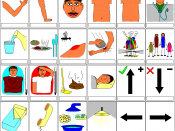Communication skills are vital in the effective management of challenging behaviour, and also generally in all social care settings.
Communication is a two way process where feelings, thoughts, information and ideas, are not only sent but can be received as well.
Every care worker and client is an individual, therefore each has there own individual style of communication and interpersonal skills. Each has to learn how communicate effectively as one, so they can understand each other better. A care worker needs to work on their communication skills and also consider their strengths and weaknesses, if they desire to work more effectively in social care.
Some ways of communicating better are described below:
Use humour or gentle teasing. Convincing someone to get out of bed or go to the bathroom is usually easier if you can make a game or joke of it. Use touch to show that you care, even when your words don't show it or when they are not understood.
Some people may shy away from contact, but most find a gentle touch reassuring. Be calm, gentle, matter-of-fact, and relaxed.
Start the communication socially. Trust is more easily established if you practice a balance of getting the task accomplished and chatting. Try spending a few minutes talking about things of interest to the client. Use good eye contact and try to be at eye level. Keep your energy focused upon the individual.
Keep rate, pitch, and volume of your speech steady and low. Lower pitch and conversational tone are easier to hear.
If you are both getting frustrated, it may be a good idea to drop it and try again later.
Sometimes a hug and a change of subject can make you both feel better. Other times you may need to leave the room and calm down. Never...


